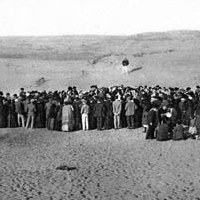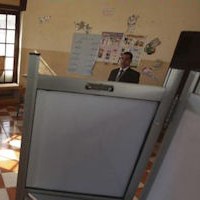![]()
Wed, June 01, 2011 | AsiaTimes Online | By Spengler
Pay close attention to this article by the analytical artist who calls himself “Spengler.” He has been arguing — and I’ve been agreeing with him — since February that the Arabic-speaking non-oil-producing countries are going to crash economically. Anyone should be able to see this and factor it into policy. Egypt especially is in a no-hope situation. Food prices — a major factor in the upheaval there — will continue to rise. No jobs will be created; no income generated; no housing built. And so Egypt will face a huge crisis. What might happen? An Islamist revolution? A little foreign war to distract attention and focus passions on hating Israel and America? I wouldn’t mind it so much if the ruling and intellectual elites in Europe and North America were just asleep. The problem is that they seem to be in a coma. Even loud alarm clocks don’t wake them. [Barry Rubin]
Humpty Obumpty and the Arab Spring
I‘ve been warning for months that Egypt, Syria, Tunisia and other Arab oil-importing countries face a total economic meltdown (see Food and failed Arab states, Feb 2, and The hunger to come in Egypt, May 10). Now the International Monetary Fund (IMF) has confirmed my warnings.
The leaders of the industrial nations waited until last weekend’s Group of Eight (G-8) summit to respond, and at the initiative of United States President Barack Obama proposed what sounds like a massive aid program but probably consists mainly of refurbishing old programs.
The egg has splattered, and all of Obumpty’s horses and men can’t mend it. Even the G-8’s announcement was fumbled; Canada’s Prime Minister John Harper refused to commit new money, a dissonant note that routine diplomatic preparation would have pre-empted.
The numbers thrown out by the IMF are stupefying. “In the current baseline scenario,” wrote the IMF on May 27, “the external financing needs of the region’s oil importers is projected to exceed $160 billion during 2011-13.” That’s almost three years’ worth of Egypt’s total annual imports as of 2010. As of 2010, the combined current account deficit (that is, external financing needs) of Egypt, Syria, Yemen, Morocco and Tunisia was about $15 billion a year.
What the IMF says, in effect, is that the oil-poor Arab economies – especially Egypt – are not only broke, but dysfunctional, incapable of earning more than a small fraction of their import bill. The disappearance of tourism is an important part of the problem, but shortages of fuel and other essentials have had cascading effects throughout these economies.



 RSS
RSS











Latest Comments
Hello Mike, Thank you for your positive feedback to the article. I felt there wasn’t too much critical analysis of ...
Thanks for this considered and well constructed article. A follow up article on the manner in which the editorial contro...
THE CLUELESSNESS OF CLAIMING THAT OBAMA'S MIDDLE EAST POLICIES WERE A FAILURE CANNOT BE FURTHER FROM THE TRUTH, WHAT THE...
As long as Obama is the president of the usa do not trust the us government......
Thank you for an good read....